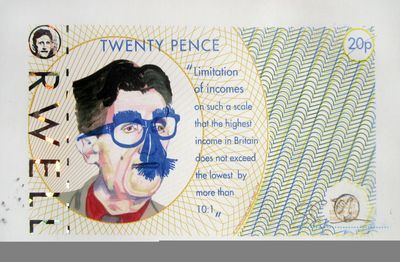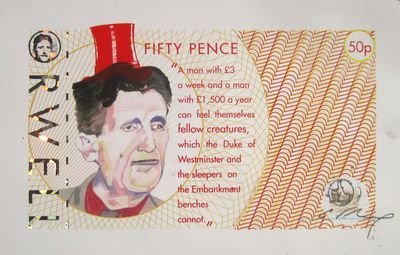How money behaves
By DAVID COLLARD
Some lines from the poem "Behaviour of Money" by Bernard Spender (Poems 1940���1942) came to mind on a balmy Saturday afternoon earlier this month, when I attended a one-day event called The Maximum Wage: A performance publishing extravaganza.
"The poor were shunted nearer to beasts. The cops recruited.
The rich became a foreign community. Up there leaped
quiet folk gone nasty,
quite strangely distorted, like a photograph that has slipped."
Hosted by the artists David and Ping Henningham, collaborating as Henningham Family Press, Maximum Wage was inspired by an observation made by George Orwell in his essay "The Lion and the Unicorn" (1941): "A man with ��3 a week and a man with ��1,500 a year can feel themselves fellow creatures, which the Duke of Westminster and the sleepers on the Embankment benches cannot".
The Hennighams and a cohort of artists had taken over the church hall of St Paul's West Hackney in north-east London for a lively and subversive investigation into the nature of money. I was one of the members of the public roped in to the first of five performances; we each picked a random straw which determined our status, then trooped off to dress up (in my case in plastic overshoes and apron, hairnet and surgical mask) before being briefed by Ping Henningham (dressed in a grey lycra outfit representing "the hidden hand of capitalism"). David Henningham acted as MC in an electric blue suit, looking uncannily like David Bowie circa Young Americans.
The performance combined hectic game-show silliness, satirical bite and economic critique: two "skilled" operatives used a screen print to produce banknotes (called "Orwells", pictured) which were then transferred to a conveyor belt on which they dried (operated by me turning a handle and, despite the simplicity of the task, making a complete hash of it) before being passed to the clerk for collation, stamping and signature. The Governor did nothing much. After about twenty minutes (and with motivational music blaring in the background), we assembled to find out how much ��� or how little ��� we had earned.
Each player���s ���wage��� was determined by their randomly allocated status and a spin of a wheel of fortune. We had produced low-denomination notes to the value of 1,300 Orwells. The Governor got 364 Orwells, the Clerk 182, skilled workers 109 and the rest of us 36. Our hard-earned wages could be spent on food in the hall (from "luxury exclusive oligarch gateaux" (45 Orwells) to "dull small cheese biscuits with hardly any ingredients" (20 Orwells a scoop). I bought some carrot cake, which cleared me out. Orwells could also be spent, in participating local shops and markets, on fish, eggs, bread, beer and other staples.
All this was seriously playful. Important points were made on posters and placards distributed around the venue, many of them sourced from government statistics. The people who make life in our country possible are at the bottom of the economic pile ��� cleaners and carers and child-minders and nurses and, one might add, most writers and artists. Those at the top (and I don't mean MPs on their ��74k) have mind-bogglingly high incomes ��� the average CEO of a FTSE 100 company earns ��4.6 million.

Incidentally: a large-format fine-art book entitled Money by the artist Prill Vieceli Cremers has just been published in Switzerland. Each text-free page shows a hugely magnified detail from a banknote. Most of the banknotes appear to be African or Asian, and some of them European. One is impressed not only by the astonishing virtuosity of of the engravers' techniques, but also by the range of imagery, some of it bizarre. Bridges, power stations, lumberjacks, oil rigs, bears, penguins, hippos, an orang-utan, more lumberjacks, teachers, cranes (mechanical and avian). Jet planes soar over modernist civic architecture, fishermen, bays and waterfalls. There's HM The Queen (in her younger years) and Colonel Gaddafi and Gandhi; a petrie dish, sunbathers, and a transparent grand piano . . . . This alluring volume ��� like Maximum Wage, unsettling too, in its own way ��� is published by Edition Patrick Frey, priced at ���40.
Peter Stothard's Blog
- Peter Stothard's profile
- 30 followers




